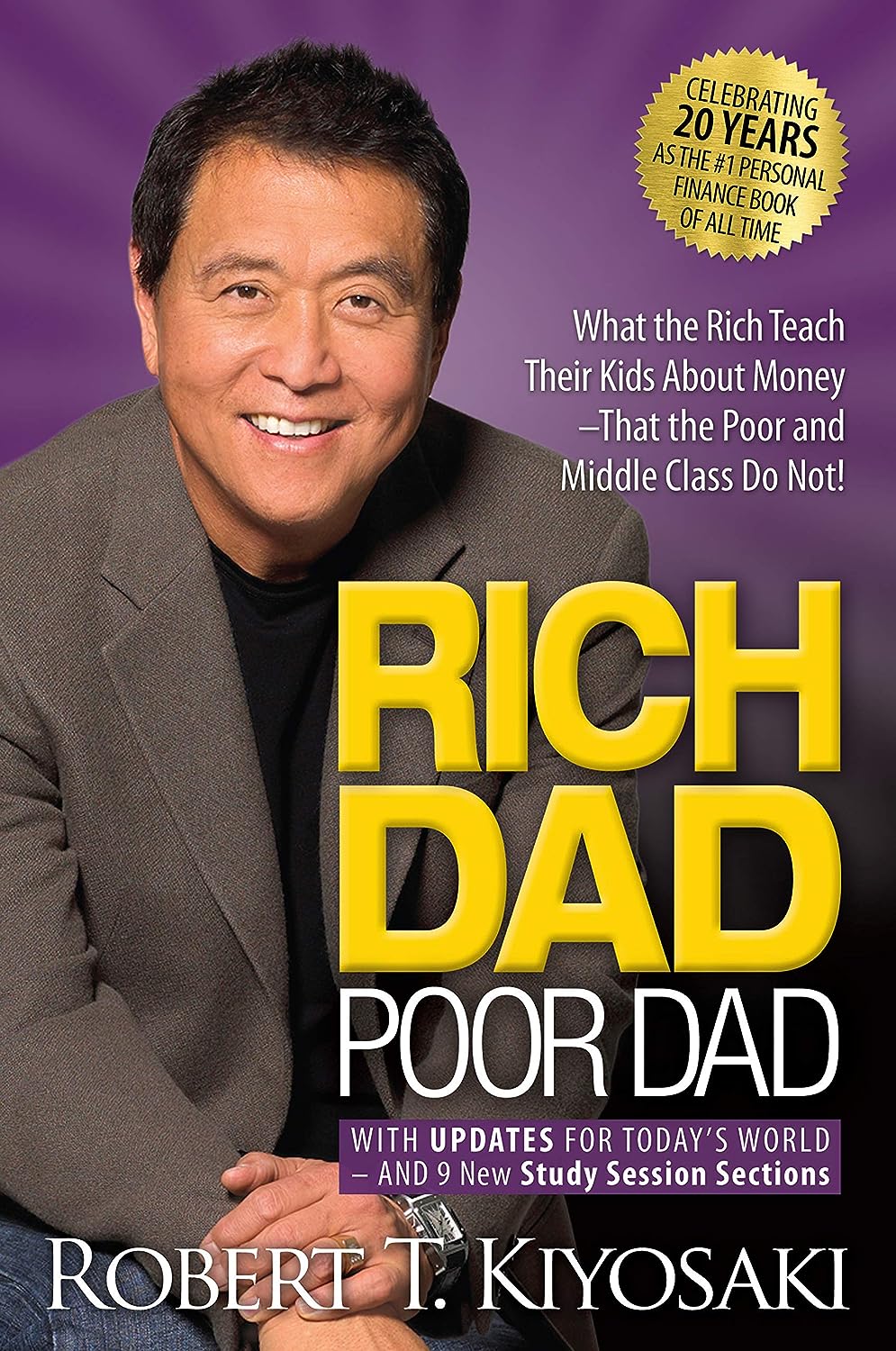Financial Education and Literacy
In the enlightening pages of "Rich Dad Poor Dad," the theme of "Financial Education and Literacy" shines brightly as a guiding star. Robert Kiyosaki passionately advocates for the importance of understanding money, investments, and financial principles as the foundation for achieving lasting wealth. He challenges the traditional educational system for its neglect of financial education, emphasizing that true financial freedom begins with knowledge.
Kiyosaki's "Rich Dad" serves as a mentor, imparting valuable lessons in financial literacy that go beyond what is taught in schools. Through engaging anecdotes and straightforward explanations, he demystifies financial concepts, making them accessible to readers of all backgrounds. He encourages readers to take charge of their financial education, urging them to seek out knowledge and develop a proactive approach to managing their finances.
In a motivating and cheerful tone, Kiyosaki inspires readers to embark on a journey of learning and self-improvement, emphasizing that financial literacy is the key to unlocking doors of opportunity and achieving financial independence. This theme resonates throughout the book, igniting a passion for financial education and empowering readers to take control of their financial destinies with confidence and enthusiasm.
Wealth Building and Asset Accumulation
Robert Kiyosaki places great emphasis on the theme of "Wealth Building and Asset Accumulation" as a fundamental pillar of financial success. With a cheerful and motivating tone, he imparts invaluable lessons about the significance of acquiring income-generating assets to secure a prosperous future.
Kiyosaki challenges conventional wisdom by drawing a clear distinction between assets and liabilities. He passionately advocates for the acquisition of assets that have the potential to generate income, such as real estate, stocks, and businesses. He argues that building a robust portfolio of such income-generating assets is the key to achieving lasting financial freedom.
One of the book's central teachings is the importance of creating passive income streams that exceed one's expenses. Kiyosaki cheerfully illustrates how individuals who prioritize asset accumulation and passive income can break free from the cycle of living paycheck to paycheck. He encourages readers to shift their focus from simply working for a paycheck to becoming savvy investors and entrepreneurs.
Through relatable anecdotes and practical advice, Kiyosaki demystifies the world of finance and investment, making it accessible to readers of all backgrounds. He provides a step-by-step approach to identifying and acquiring income-generating assets, nurturing a mindset of financial abundance, and achieving financial security.
Moreover, Kiyosaki's cheerful narrative inspires readers to take immediate action in their financial lives. He emphasizes that the journey to wealth building begins with knowledge and the courage to make informed decisions. His teachings empower readers to break free from financial limitations, encouraging them to embrace the path of asset accumulation and embark on a journey toward financial prosperity with enthusiasm and unwavering determination.
"Rich Dad Poor Dad" is a powerful guide that ignites a passion for wealth building and asset accumulation. Through Kiyosaki's cheerful and motivating writing style, readers are not only educated about financial principles but also inspired to take concrete steps toward securing their financial future through the accumulation of income-generating assets. It serves as a beacon of hope for those seeking financial independence and serves as a reminder that anyone can achieve lasting wealth with the right knowledge and mindset.
Entrepreneurship and Investment
The theme of "Entrepreneurship and Investment" stands out as a beacon of opportunity. Robert Kiyosaki passionately advocates for the path of entrepreneurship and strategic investment as powerful vehicles for achieving financial success and independence. With a cheerful and motivating tone, he inspires readers to embrace an entrepreneurial mindset and consider investment as a means to build wealth.
Kiyosaki's book challenges traditional notions of job security and the 9-to-5 grind, encouraging readers to think beyond the constraints of a paycheck. He shares valuable insights into the world of entrepreneurship, highlighting the potential for creative business ventures to generate income and wealth. Through engaging anecdotes and practical advice, Kiyosaki demystifies the process of starting and running a business, making it accessible to readers of all backgrounds.
Furthermore, he underscores the significance of smart investment decisions as a way to multiply one's wealth. Kiyosaki cheerfully explains the different investment opportunities available, including real estate, stocks, and small businesses. He empowers readers with the knowledge and confidence to make informed investment choices that align with their financial goals.
Throughout the book, Kiyosaki's motivating narrative instills a sense of possibility and excitement about pursuing entrepreneurial ventures and making strategic investments. He emphasizes that entrepreneurship and investment are not reserved for a select few but are accessible paths to financial success for anyone willing to learn and take action.
Mindset Shift and Taking Calculated Risks
The theme of "Mindset Shift and Taking Calculated Risks" shines brightly as a catalyst for financial transformation. Robert Kiyosaki passionately guides readers toward a profound shift in mindset, encouraging them to break free from conventional thinking and embrace the power of calculated risks in their pursuit of financial success. With a motivating and cheerful tone, he inspires readers to adopt a mindset that is open to new possibilities and unafraid of stepping outside their comfort zones.
Kiyosaki challenges the traditional notion of playing it safe and emphasizes the importance of taking calculated risks in the world of finance and investment. He shares personal anecdotes and practical insights that illustrate how a change in mindset can lead to transformative actions. Through relatable stories, he demonstrates the benefits of thinking like an investor and entrepreneur, rather than a passive consumer of financial products.
Furthermore, Kiyosaki cheerfully demystifies the concept of financial risk, highlighting the distinction between calculated risks and reckless behavior. He provides readers with the tools and knowledge to make informed decisions, ensuring that their financial risks are calculated and strategic.
Throughout the book, Kiyosaki's motivating narrative serves as a call to action, urging readers to shift their mindset and embrace the idea that calculated risks can lead to greater financial rewards. He empowers readers to take control of their financial destinies with confidence and enthusiasm, emphasizing that a shift in mindset is the first step toward achieving lasting wealth.
Financial Independence and Freedom
In "Rich Dad Poor Dad," the theme of "Financial Independence and Freedom" shines like a beacon of hope and aspiration, guiding readers through the choppy waters of personal finance with the steadiness of a seasoned captain. This book, a masterpiece by Robert Kiyosaki, isn't just a financial guide; it's a revolutionary outlook on how we perceive money and wealth.
Kiyosaki takes us on an enlightening journey, contrasting the differing financial philosophies of his two dads: his biological father, the 'Poor Dad,' and the father of his best friend, the 'Rich Dad.' The dichotomy presented is striking: one dad struggled financially despite a solid education and a steady job, while the other achieved financial freedom despite dropping out of school at a young age.
The heart of this book lies in its profound and simple wisdom: the key to financial independence and freedom isn't in the amount of money you earn but in how you manage and multiply it. Kiyosaki stresses the importance of financial education, urging readers to break free from the 'rat race' of working for money and instead learn to have money work for them.
He introduces us to the concept of passive income, the holy grail of financial independence. By investing in assets, be it real estate, stocks, or businesses, and minimizing liabilities, one can create a steady stream of income that doesn't require active work. This is the path to freedom—the freedom to pursue your passions, spend time with loved ones, and live life on your own terms.
The narrative is peppered with engaging anecdotes and practical advice, making the concept of financial freedom not only accessible but achievable for the average reader. Kiyosaki doesn't just offer a dream; he provides a roadmap. It’s about understanding the difference between assets and liabilities and making informed choices that lead towards wealth creation.
In essence, "Rich Dad Poor Dad" is more than a book; it's a mindset shift. It's about looking beyond the conventional wisdom of 'work hard and save' to understand the rules of money that the rich play by. It’s an invitation to join the ranks of those who don't just dream of financial freedom but take bold steps to achieve it.
As you turn the pages of this inspiring book, you'll find yourself equipped not just with financial strategies but with a newfound enthusiasm to take control of your financial destiny. "Rich Dad Poor Dad" isn’t just a reading experience; it’s a wake-up call to take the reins of your financial future and gallop towards the dawn of financial independence and freedom.

